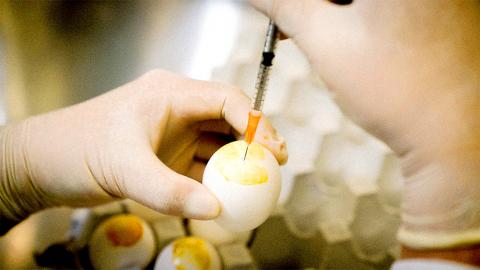Academia Sinica researchers have developed a “more potent” vaccine against cross-strain influenza viruses using chicken eggs, the institution said yesterday, adding that the technology has been sold to a transnational pharmaceutical firm.
Due to the variability of the flu virus, which alters its surface proteins, vaccines are only effective against closely matched virus strains and must be regularly updated, which is a headache for vaccine developers, the team said in a news release.
Led by Wong Chi-huey (翁啟惠), a distinguished research fellow, and Alex Ma (馬徹), an associate research fellow at Academia Sinica’s Genomics Research Center, the team used the eggs to produce monoglycosylated inactivated split H1N1 virus vaccine, which induced better immune responses on mice.

Photo courtesy of Academia Sinica
The new vaccine is expected to be three or four times more effective than traditional flu vaccines, the researchers said.
Their findings were detailed in a paper titled “Egg-based influenza split virus vaccine with monoglycosylation induces cross-strain protection against influenza virus infections,” which was published this month in Proceedings of the National Academy of Sciences of the United States.
To expose more antigenic sites shielded by glycans, the team developed a strategy to remove the glycans from the virus’ surface, the paper said, adding that after immunization with the monoglycosylated split virus vaccine, mice had broader immune responses against cross-strain H1N1 influenza infections.
Flu causes hundreds of thousands of deaths worldwide each year, the team said, adding that it hoped the so-called “flu season” could someday become history.
The researchers obtained several patents on the technology worldwide and sold it to a multinational pharmaceutical firm in accordance with Academia Sinica’s intellectual property and technology transfer procedure, the institution said.
The flu vaccine studies go back a decade, and the technology was transferred to OPKO Health Inc’s Taiwan branch years ago, Ma said, adding that the firm is responsible for clinical testing of the medication.
Wong, who was Academia Sinica’s president from Oct. 2006 to May 2016, was in 2017 indicted on corruption charges by the Shilin District Prosecutors’ Office over a deal he helped make with OBI Pharma Inc (浩鼎).
The Shilin District Court in December last year acquitted him of all charges.
The prosecutors last month said they would not appeal the ruling.

Taiwanese can file complaints with the Tourism Administration to report travel agencies if their activities caused termination of a person’s citizenship, Mainland Affairs Council Minister Chiu Chui-cheng (邱垂正) said yesterday, after a podcaster highlighted a case in which a person’s citizenship was canceled for receiving a single-use Chinese passport to enter Russia. The council is aware of incidents in which people who signed up through Chinese travel agencies for tours of Russia were told they could obtain Russian visas and fast-track border clearance, Chiu told reporters on the sidelines of an event in Taipei. However, the travel agencies actually applied

Japanese footwear brand Onitsuka Tiger today issued a public apology and said it has suspended an employee amid allegations that the staff member discriminated against a Vietnamese customer at its Taipei 101 store. Posting on the social media platform Threads yesterday, a user said that an employee at the store said that “those shoes are very expensive” when her friend, who is a migrant worker from Vietnam, asked for assistance. The employee then ignored her until she asked again, to which she replied: "We don't have a size 37." The post had amassed nearly 26,000 likes and 916 comments as of this

New measures aimed at making Taiwan more attractive to foreign professionals came into effect this month, the National Development Council said yesterday. Among the changes, international students at Taiwanese universities would be able to work in Taiwan without a work permit in the two years after they graduate, explainer materials provided by the council said. In addition, foreign nationals who graduated from one of the world’s top 200 universities within the past five years can also apply for a two-year open work permit. Previously, those graduates would have needed to apply for a work permit using point-based criteria or have a Taiwanese company

The Shilin District Prosecutors’ Office yesterday indicted two Taiwanese and issued a wanted notice for Pete Liu (劉作虎), founder of Shenzhen-based smartphone manufacturer OnePlus Technology Co (萬普拉斯科技), for allegedly contravening the Act Governing Relations Between the People of the Taiwan Area and the Mainland Area (臺灣地區與大陸地區人民關係條例) by poaching 70 engineers in Taiwan. Liu allegedly traveled to Taiwan at the end of 2014 and met with a Taiwanese man surnamed Lin (林) to discuss establishing a mobile software research and development (R&D) team in Taiwan, prosecutors said. Without approval from the government, Lin, following Liu’s instructions, recruited more than 70 software